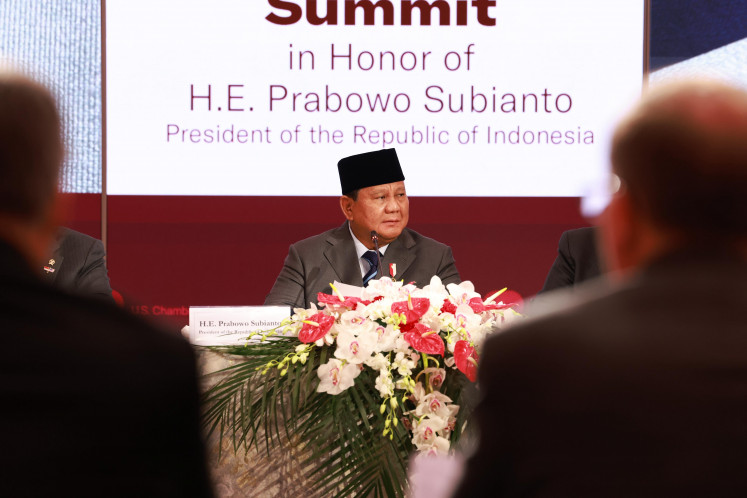Popular Reads
Top Results
Can't find what you're looking for?
View all search resultsPopular Reads
Top Results
Can't find what you're looking for?
View all search resultsResponding to fundamental crisis within Islam
Indonesia has continued to grapple with the tension that exists between Islamic orthodoxy and the ideals of equality of citizenship and equality before the law, which form the bedrock of both its political settlement and the modern nation state.
Change text size
Gift Premium Articles
to Anyone
W
hen attorney Stephen Rasche left his practice in the United States and moved to northern Iraq to assist its long-suffering Christians, he confronted a grotesque reality that most Westerners have the luxury of ignoring. In The Disappearing People, Rasche paints a disturbingly vivid picture of the tragedy he witnessed in Iraq.
Rasche does not shy away from identifying the fundamental cause of Christianity’s disappearance from its historic birthplace in the Middle East. The calamitous fate of Iraq’s Christians is simply the latest chapter in a long and tragic history of religious persecution in the Muslim world.
From sub-Saharan Africa to South and Southeast Asia, religious minorities often experience severe discrimination and violence inflicted by those who embrace a supremacist, ultraconservative interpretation of Islam that has been widely propagated in recent decades by Middle East states, including long-time United States allies Saudi Arabia and Qatar.
If we wish to end this primordial cycle of hatred, tyranny and violence — which also periodically erupts, to tragic effect, on the streets of Jakarta, Mumbai, London, Paris and New York — we must ask a number of questions that require difficult and honest answers.
Perhaps the most burning of these questions is “Why?” Why did the killers of the Islamic State (IS) display such remarkable savagery toward Yazidis and Christians? Any informed and intellectually honest inquiry into this question will produce an unambiguous and profoundly disturbing answer: the doctrine, goals and strategy of these extremists can be readily traced to specific tenets of orthodox, authoritative Islam and its historic practice, including those portions of fiqh (classical Islamic law, also known as sharia) that enjoin Islamic supremacy, encourage enmity toward non-Muslims and require the establishment of a universal Islamic state, or caliphate.
IS’ quest to establish an Islamic state and the inevitable consequences of this for anyone deemed to be “non-Muslim” is not a historical aberration in the Middle East. Rather, it is the historical norm.
Throughout Islamic history, until the collapse of the Ottoman empire and the formal abolition of the caliphate in 1924, the Middle East has been dominated by caliphs and/or those who ruled in their name and governed according to the provisions of classical Islamic law.
The full enjoyment of legal privileges by the subjects of these empires was predicated on their religious identity conforming to that of the empire. For example, the Ottoman Caliphate systematically discriminated against non-Muslims by enforcing a wide range of orthodox Islamic tenets that govern the treatment of conquered non-Muslims, or dhimmiyun, as did other Sunni and Shi‘ite rulers throughout the Islamic world, with the exception of Nusantara (the Indonesian archipelago) and of Java in particular.
These teachings, even when not enshrined in statutory law, nonetheless retain considerable religious authority and social legitimacy among Muslims, forming part of what Indonesia’s Nahdlatul Ulama (NU) — the world’s largest Islamic organization — has termed the “prevailing Muslim mindset.”
The fundamentalist/supremacist view of Islam that these obsolete and problematic tenets of Islamic orthodoxy endorse may be readily harnessed to serve the interests of those with a political agenda. This is evident from history and the savage conflicts now roiling much of the Islamic world. In 2017, the young adult movement of NU published an 8,000-word analysis of the manner in which state and non-state actors have systematically “weaponized” orthodox Islamic teachings.
Far from the Islamic “heartland” of the Arab, Turkish and Persian Middle East, Indonesia has never been a part of any of that region’s historic caliphates. This separation has enabled the nusantara (archipelago) civilization to develop a spiritual view of Islam that tends to view sharia as a set of universal principles that all religions recognize and acknowledge, rather than an inflexible set of rules developed by classical Muslim jurists for running a pre-modern state.
This unique civilizational heritage enabled Muslims on the island of Java — which constitutes the geographic, political and economic center of Indonesia — to defeat Muslim extremists in the 16th century and restore freedom of religion for all Javanese two centuries before the Virginia Statute of Religious Freedom and the Bill of Rights led to the separation of state and religion in the US.
It was this “civilizational wisdom” that inspired the creation of Indonesia as a multireligious and pluralistic nation state in 1945. It also enabled Indonesia’s first democratically elected president, Abdurrahman Wahid — backed by NU — to transform it into the world’s third-largest democracy following the overthrow of president Soeharto’s authoritarian regime in 1998.
In spite of these enormous advantages, however, Indonesia has continued to grapple with the tension that exists between Islamic orthodoxy and the ideals of equality of citizenship and equality before the law, which form the bedrock of both its political settlement and the modern nation state.
So long as obsolete, medieval tenets within Islamic orthodoxy remain the dominant source of religious authority throughout the Muslim world, Indonesian Islamists will continue to draw power and sustenance from developments in the world at large. This is especially true so long as key state actors — including Iran, Turkey, Saudi Arabia, Qatar and Pakistan — continue to weaponize problematic tenets of Islamic orthodoxy in pursuit of their respective geopolitical agendas.
The cycle of retaliatory bloodshed we are witnessing is deeply rooted in history, including ancient animosities embedded in the collective memory of entire ethnic and religious groups. It is precisely these hatreds that extremists seek to awaken through heinous and shocking acts of terror. If we are to avert disaster and stem this primordial cycle of hatred, tyranny, and violence, it is imperative for people of goodwill of every faith and nation to join in building a global consensus to prevent the political weaponization of Islam, whether by Muslims or non-Muslims, and to curtail the spread of communal hatred by fostering the emergence of a truly just and harmonious world order, founded on respect for the equal rights and dignity of every human being.
In 2019, the NU Central Board published fiqh rulings based on a Munas (gathering) that endorsed the concept of a nation-state rather than caliphate, recognized all citizens, irrespective of their ethnicity or religion, as having equal rights and obligations, decreed that Muslims must obey the laws of any modern nation-state in which they dwell, and affirmed that Muslims have a religious obligation to foster peace rather than wage war on behalf of their co-religionists, whenever conflict erupts between Muslim and non-Muslim populations anywhere in the world.
A central feature of the Munas rulings is the abolition of the legal category of kafir (infidel) within Islamic law, so that non-Muslims may enjoy full equality as fellow citizens in their own right rather than rely on protection at the sufferance of a Muslim ruler.
Rasche has described an existential threat that confronts all of us, Muslim and non-Muslim alike. It simply remains to be seen whether we will heed his warning and act in time to prevent similar disasters from befalling us.
***
The writer is a Muslim scholar and secretary-general of the Nahdlatul Ulama supreme council. The original article was published in Public Discourse.










